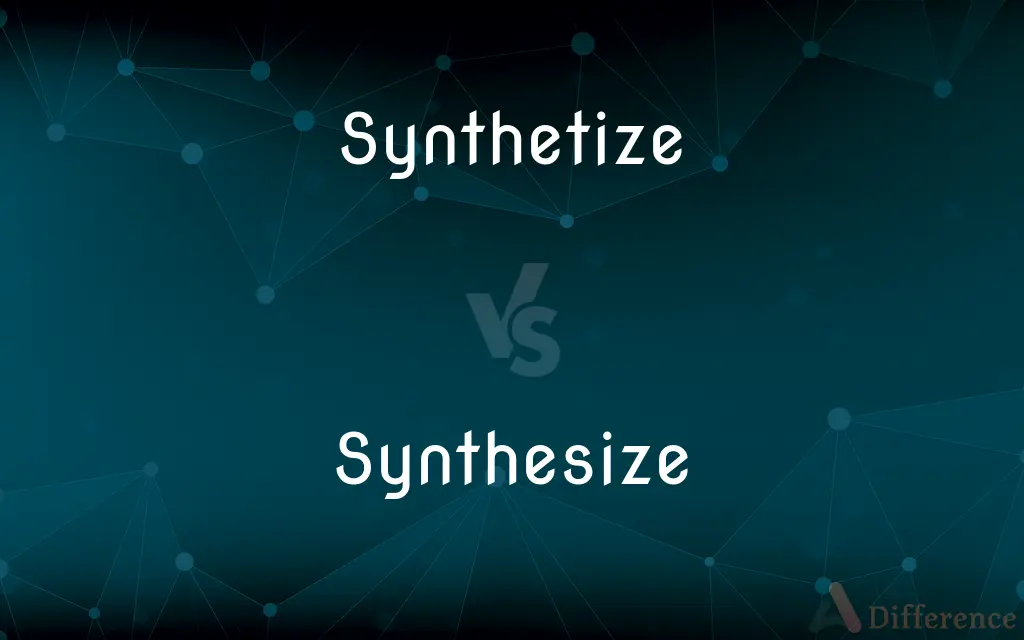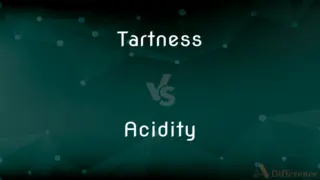Synthetize vs. Synthesize — What's the Difference?
By Maham Liaqat & Fiza Rafique — Updated on March 31, 2024
Synthetize emphasizes the process of combining elements to form a whole, while synthesize focuses on creating something new through combination or integration.

Difference Between Synthetize and Synthesize
Table of Contents
ADVERTISEMENT
Key Differences
Synthetize is often used in a broad, less technical context, implying the act of combining various elements to create a cohesive whole. It suggests a process of bringing together disparate components to form something unified. Whereas synthesize is commonly used in scientific, technical, and academic contexts, emphasizing the creation of something new by integrating different elements or ideas. This term is closely associated with chemistry, where it describes the process of creating chemical compounds by reaction from simpler materials, but it's also prevalent in music, writing, and art, where it implies a fusion of styles or concepts to produce something original.
While synthetize might be found in discussions about abstract, philosophical, or theoretical concepts, synthesizing is more likely to be discussed in concrete terms, with specific methodologies and outcomes. On the other hand, synthesize is preferred when discussing the practical application of combining elements to produce something new, especially in a controlled, purposeful manner.
Synthetize can sometimes be seen as a more passive process of combination without the explicit intention of creating something new. It might refer to the natural or unplanned coming together of ideas or elements. Synthesize, by contrast, involves an active process of creation, requiring deliberate effort to combine different elements in order to produce something novel or enhanced.
The choice between synthetize and synthesize often depends on the context and the speaker's or writer's preference. However, synthesize is the more commonly used term and is recognized by most dictionaries as the standard spelling and concept, especially in scientific and academic contexts. Synthetize, while understood, is less frequently used and may be considered a variant or less formal.
In terms of etymology, both terms derive from the Greek 'synthesis', meaning 'to put together', reflecting their shared core concept of combining or integrating elements. However, synthesize has become the dominant form in modern usage, particularly in professional and academic settings, where precision and clarity are paramount.
ADVERTISEMENT
Comparison Chart
Usage Context
Broad, often less technical
Scientific, technical, academic
Process
Combining elements to form a whole
Creating something new through combination
Association
Philosophical, theoretical concepts
Chemistry, music, writing, art
Action
Passive combination
Active creation
Prevalence
Less common, variant form
Commonly used, standard spelling
Compare with Definitions
Synthetize
The act of bringing together disparate components.
Through dialogue, the workshop aimed to synthetize differing viewpoints.
Synthesize
Combining styles or concepts in music, art, or writing.
The composer synthesizes jazz and classical music in his latest piece.
Synthetize
To combine elements to form a cohesive whole.
The director sought to synthetize various cinematic techniques into his new film.
Synthesize
Active effort to produce a novel outcome.
The researcher synthesized data from various studies to propose a new theory.
Synthetize
A process of unification without explicit creation.
The novel synthetizes multiple genres, creating a unique narrative style.
Synthesize
To create something new by combining different elements or ideas.
The chemist synthesized a new compound from simple ingredients.
Synthetize
The merging of ideas or elements in a theoretical context.
The philosopher's work synthetizes ancient and modern thought.
Synthesize
The process of integration in a controlled manner.
The artist synthesizes classical and modern elements in her paintings.
Synthetize
A passive coming together of concepts.
Over time, cultures tend to synthetize, adopting traits from each other.
Synthesize
The creation of chemical compounds by reaction.
The laboratory synthesized the substance through a series of complex reactions.
Synthetize
(dated) To synthesize
Synthesize
Make (something) by synthesis, especially chemically
The drug was first synthesized in 1929
Synthetize
To combine; to unite in regular structure.
Synthesize
Produce (sound) electronically
Trigger chips that synthesize speech
Synthesize
To combine so as to form a new, complex product
"His works synthesize photography, painting and linguistic devices" (Paul Taylor).
Synthesize
To form or produce by chemical synthesis.
Synthesize
To produce (sound or music) by means of a synthesizer.
Synthesize
To form a synthesis.
Synthesize
(transitive) To combine two or more things to produce a new product.
Synthesize
To be combined producing a new, more complex product.
Synthesize
To produce a substance by chemical synthesis.
Synthesize
To be produced by chemical synthesis.
Synthesize
To combine by synthesis; to unite.
Synthesize
To produce by synthesis; as, to synthesize albumin.
Synthesize
Combine so as to form a more complex, product;
His operas synthesize music and drama in perfect harmony
Synthesize
Combine and form a synthesis
Common Curiosities
In which contexts is synthesize preferred?
Synthesize is preferred in scientific, technical, and academic contexts.
Can synthetize and synthesize be used interchangeably?
While they can sometimes be used interchangeably, synthesize is the more commonly accepted term, especially in professional settings.
How does synthetize relate to abstract concepts?
It often refers to the theoretical or philosophical combination of ideas without a focus on physical creation.
How does synthesizing affect innovation?
It is crucial for innovation, enabling the creation of new products, ideas, and methods from existing ones.
What is the main difference between synthetize and synthesize?
Synthetize implies combining elements to form a whole, while synthesize focuses on creating something new through combination or integration.
Does synthetize have a passive connotation?
Yes, it can imply a more passive or natural combination of elements, unlike the active process of synthesis.
In which fields is the ability to synthesize information valuable?
In nearly all fields, but especially in science, technology, education, and the arts.
Can you give an example of synthesizing in everyday life?
Cooking, where ingredients are combined to create new dishes, is a form of synthesis.
What does it mean to synthetize ideas?
To bring together different ideas to form a cohesive, unified concept.
What skills are required to synthesize information effectively?
Critical thinking, creativity, and the ability to see connections between disparate pieces of information.
What is involved in synthesizing a new compound?
Combining simpler substances through chemical reactions to create a new compound.
Why is synthesizing important in scientific research?
It allows for the creation of new materials, theories, or solutions by combining existing knowledge and substances.
Is there a preference for using synthesize in academic writing?
Yes, synthesize is generally preferred for its precision and recognition in academic and professional contexts.
Is synthetize recognized in most dictionaries?
Synthetize may be less commonly recognized and is often considered a variant of synthesize.
What is the etymological origin of synthesize?
It derives from the Greek 'synthesis', meaning 'to put together'.
Share Your Discovery

Previous Comparison
Albeit vs. Though
Next Comparison
Tartness vs. AcidityAuthor Spotlight
Written by
Maham LiaqatCo-written by
Fiza RafiqueFiza Rafique is a skilled content writer at AskDifference.com, where she meticulously refines and enhances written pieces. Drawing from her vast editorial expertise, Fiza ensures clarity, accuracy, and precision in every article. Passionate about language, she continually seeks to elevate the quality of content for readers worldwide.
















































